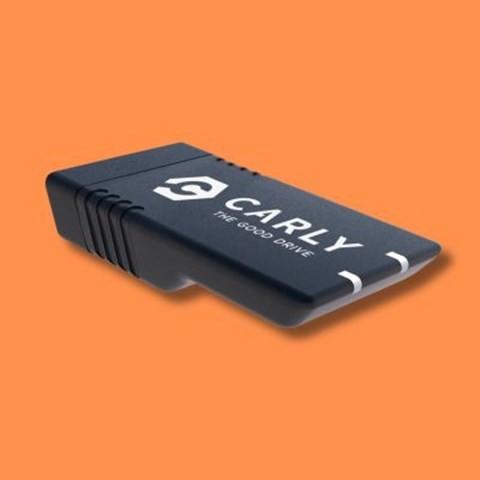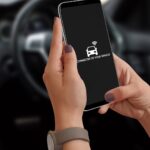The world of car diagnostics has been revolutionized, and Carly is at the forefront of this change. This compact, pocket-sized device is designed to delve deep into your vehicle’s systems, gathering a wealth of data points – potentially thousands. It then seamlessly transmits this information to your smartphone via the user-friendly Carly app, providing you with a comprehensive overview of any detected issues.
Utilizing a powerful 32-bit ARM processor, the Carly scanner is capable of reading electronic control units (ECUs) across a vast range of vehicles, from everyday models like the VW Polo to luxury marques such as Bentley. Its compatibility extends to virtually any petrol car manufactured for the EU market from 2001 onwards (and from 2004 for diesel vehicles), thanks to the mandated OBD II port. This broad compatibility makes Carly a truly versatile tool for vehicle diagnostics. The core purpose of any OBD II scanner is to identify potential problems early, allowing for preventative maintenance and potentially saving significant sums on future car repairs.
Carly distinguishes itself from many OBD II scanners by offering features like Mileage Check, designed to detect mileage discrepancies, all within a remarkably small and affordable package. This combination of features makes the Carly scanner incredibly appealing. Furthermore, with a premium subscription, users can unlock an even more in-depth analysis of their vehicle’s inner workings, making it a compelling option for both everyday car owners and enthusiasts.
This review is conducted by Aaron Hussain, a classic car owner and passionate advocate for preventative vehicle maintenance. He firmly believes that proactive issue monitoring is crucial for safeguarding a vehicle’s longevity, regardless of its age, size, or value.
Verdict: A Powerful Pocket Tool for Preventative Car Care, Though Minor App Quirks Exist.
Score: 4/5
Carly OBD2 Scanner: The Pros – Simplicity and Versatility
One of the most significant advantages of the Carly OBD2 scanner is its sheer simplicity. The process is incredibly straightforward: locate the OBD II port in your car (typically found beneath the steering wheel), plug in the Carly device, and let it work. The scanner immediately begins gathering data and transmits it to the Carly app, presenting the readings in an easily understandable format. You won’t need to consult a complex car repair manual to decipher the information. While the scanning process can take some time, especially in vehicles with numerous electronic modules (expect an average of 5-10 minutes), the wait is worthwhile for the depth of analysis provided. Once complete, you can effortlessly navigate through the app, identify potential issues that require attention, and even clear error codes as needed.
However, the standout feature of the Carly scanner is undoubtedly its Mileage Check. This innovative function can detect inconsistencies in a vehicle’s recorded mileage by cross-referencing data from various electronic modules. It essentially acts as a fraud detection tool, revealing if the odometer has been tampered with or “rolled back.” During our tests, the vehicles we examined displayed legitimate mileage information, providing peace of mind. This feature is particularly invaluable when inspecting a used car before purchase.
The Carly scanner’s broad compatibility is another major selling point. Since 2004, all cars have been mandated to include an OBD II port, ensuring near-universal compatibility with the Carly device. From everyday family cars to high-performance vehicles like an Aston Martin Vulcan or a Shelby Ultimate Aero, the Carly scanner can be plugged in and provide diagnostic insights. For anyone considering purchasing a car manufactured in this millennium, the Carly OBD2 scanner is an intelligent tool to have on hand during a test drive, offering an extra layer of security and information.
Carly Scanner: The Okay Aspects – Data Interpretation and Value
It’s important to remember that OBD2 scanners like Carly present raw data. If a vehicle has been previously scanned, a considerable amount of historical data may still be present and displayed. The responsibility ultimately falls on the user to interpret this data and clear codes appropriately. While the Carly scanner provides a wealth of information, users need to exercise discernment in identifying genuinely critical issues from less significant historical codes. However, it’s a positive aspect that the Carly scanner doesn’t filter out or skip any recorded issues, ensuring a comprehensive overview.
The value proposition of the Carly scanner is somewhat nuanced. The base product, priced just over £56, offers the fundamental ability to connect and diagnose your vehicle. The Carly Used Car Check feature is also freely accessible to all users who download the app and create an account.
The premium subscription model introduces variable pricing, depending on your car’s make and the features unlocked. For example, unlocking the full potential of the Carly scanner with a Mercedes-Benz may incur a higher cost than with a Ford. Conversely, some manufacturers, like Holden, may only offer basic package compatibility. Therefore, prospective buyers should investigate the specific features and pricing available for their vehicle’s manufacturer to determine the best value for their needs.
Carly Scanner: The Downsides – Scan Speed and App Quirks
Given the complexity of modern vehicles and the numerous electronic components and modules that need to be analyzed, the Carly scanner can take a noticeable amount of time to complete a full diagnostic scan. While this is technically understandable, waiting up to ten minutes for a diagnosis can feel somewhat lengthy. The scan duration is also vehicle-dependent; scanning a technologically advanced Mercedes S-Class will naturally take longer than a simpler car like a Toyota GT86.
More experienced mechanics might find the Carly scanner’s diagnostics somewhat basic and the response times a little slow. However, for the average car owner or used car buyer, the Carly scanner provides an invaluable level of insight, potentially distinguishing between a reliable vehicle and a problematic one.
Beyond the scanner itself, the Carly app does have a couple of minor drawbacks. One persistent annoyance is a feedback pop-up that requires a minimum character count to dismiss. This pop-up frequently appears during the Used Car Check and can interrupt the user experience. While it doesn’t affect diagnostic accuracy, it is a usability issue.
Another peculiar issue is found in the car selection menu. For example, the Audi RS2 is incorrectly listed as being manufactured between 2000 and 2005, which is factually inaccurate. These minor app quirks, while not deal-breakers, detract slightly from the overall polished feel of the Carly system.
New Feature: Carly Community (November 2024)
Carly has recently enhanced its platform with the Carly Community, launched in November 2024. This online forum is designed to connect motorists, allowing them to share queries and receive advice from certified mechanics and other owners of similar vehicle makes and models.
Users can specify their vehicle make and model, categorize their issue, and describe the symptoms. They can then elaborate on their question before posting it to the Carly Community for responses. The platform also allows users to browse existing queries from other vehicle owners. Our initial observations of the Carly Mechanic responses suggest they are generally detailed and helpful in pointing towards potential issues. While the Carly Community appears to be a valuable resource for gaining insights and narrowing down potential problems, it’s crucial to remember that online advice should not replace a thorough, in-person inspection by a qualified mechanic.
New Feature: Repair Cost Calculator (August 2024)
Launched in August 2024, the Carly Repair Cost Calculator is another valuable addition to the Carly ecosystem. This tool aims to provide estimated repair costs for various vehicle issues.
Users can input information obtained from their Carly scanner for more precise cost estimations. Alternatively, users without scan data can manually input their vehicle make and model and select from a list of symptoms using drop-down menus. The results page displays potential issues along with tiered repair cost estimates, indicating the potential severity of the problem based on repair expenses. The calculator even provides estimated labor times.
As an example, we tested the calculator with a 2014 BMW 5-Series experiencing squeaky brakes. The results were surprisingly informative, presenting four potential causes with cost estimates ranging from £200 to £2,000, including estimated labor time. Currently, the Repair Cost Calculator is not integrated into the Carly app, which would be a beneficial enhancement. Despite this, it’s a promising companion tool to the Carly scanner, although the accuracy of its cost estimations requires further real-world validation.
Other OBD2 Scanners to Consider:
- TOPDON Topscan OBD2 Scanner, RRP £69.99
- Autel OBD2 Code Reader, RRP £29.99
- Bosch Automotive Tools OBD 1150 Trilingual Scan Tool, RRP £87.78
How We Tested the Carly Scanner:
The Carly Scanner was rigorously tested across several different vehicles to evaluate its versatility. Our testing focused on the user-friendliness of the Carly app, as well as the ease of physically connecting and disconnecting the scanner. Due to logistical constraints, we did not undertake actual repairs or clearing of diagnostic messages as part of this review.
Who Tested the Carly Scanner?
This Carly Scanner review was conducted by Aaron Hussain. As a strong proponent of preventative maintenance for his classic Mercedes, Aaron found the Carly system to be highly relevant to his vehicle care philosophy, particularly as he considers acquiring a more modern daily driver.
Disclaimer: Please note that while we may receive commissions or other compensation from links on this website, this does not influence our product selections. Read our ethics policy to learn more about our commitment to unbiased reviews.

